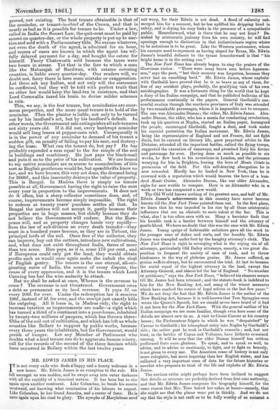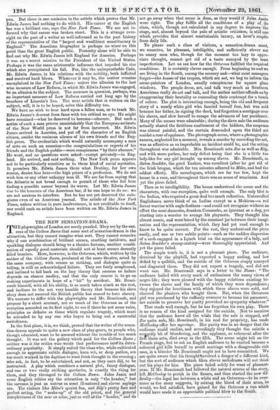MR. EDWIN JAMES IN HIS PLACE.
TT is not every exile who finds,alappy and a hearty welcome in a new home. Mr. Edwin James is an exception to the rule. His fall amongst us was sudden, and he swept away into outer darkness with all the rapidity of a transient meteor. It has been but to rise again upon another continent. Like Columbus, he bends his course westward, not knowing what termination of his labours to expect. Like Columbus, he has found America, and a career of fame. He is once again upon his road to glory. The nymphs of Marylebone need
not weep, for their Edwin is not dead. A flood of calamity sub- merged him for a moment, but he has uplifted his dripping head in
safety, and is drying his oozy locks in the presence of a sympathetic, public. Henceforward, what is there that he may not hope ? Ba- nished by aristocratic jealousy from his own country, he will find
openings enough to distinction in that indiscriminate region where to be notorious is to be great. Like the Western postmaster, whom his enemies used to represent as having sloped for Texas, Mr. Edwin James's boastful defiance to the tyrant henceforward is that "his bright home is in the setting sun."
The New York Times has already begun to sing the praises of the illustrious visitor. "There were many brave men before Agamem- non," says the poet, " but their memory was forgotten, because they never had an ennobling bard." Mr. Edwin James, whose exploits' with Garibaldi have proved that he is as brave as any of them, for fear of any accident plays, probably, the gratifying task of his own autobiographer. It was a fortunate thing for the world that he kept a diary of his Italian campaign, and that he published bulletins of his performances continually in the papers. General Garibaldi's suc- cessful ovation through the southern provinces of Italy was attended by two remarkable personages, whom it is impossible not to compare. The one was Alexandre Dumas ; the other, Mr. Edwin James. Alex- andre Dumas, the elder, who has a mania for conducting revolutions, took up his quarters at Naples, started an Italian paper, harangued the people, encouraged Garibaldi, fought a duel, and took under his especial protection the Italian movement. Mr. Edwin James, being the representative of England and not France, did not fight duels, but he entered on literary life, gave perpetual advice to the Dictator, attended all the important battles, rallied the flying troops, suggested the execution of runaways, and promised Italy his favour and patronage for ever. Having done as much as possible in six weeks, he flew back to his avocations in London, and the prisoners wearying for him in Brighton, leaving the hero of Monte Cristo in possession of the field. For this self-denying abnegation he is now rewarded. Hardly has he landed in New York, than he is crowned with a reputation which would beseem the hero of a hun- dred Monte Cristos. Alexandre Dumas, like Our older Alexander, sighs for new worlds to conquer. Here is an Alexander who in a week or two has conquered a new world.
The Old World knows nothing of its greatest men, and half of Mr. Edwin James's achievements in this country have never become known till the New York Times pointed them out. In the first place, we learn that he was impeded in his rise by all those aristocratic influences that are an obstacle to mere talent at the bar. AU; is what, alas ! is too often seen with us. Many a barrister finds that his humble rank is a barrier between himself and the attorney of gentle blood. We have no doubt that this was the case with Mr. Edwin James. Young sprigs of fashionable solicitors gave all the work to the younger sons of dukes and earls, and the humble Mr. Edwin James was trampled under foot by the haughty attorney's clerk. The New York Times is right in scourging what is the crying sin of all attorneys, particularly Old Bailey attorneys, namely, a too great dis- position to frequent the society of men of rank, and to throw hindrances in the way of plebeian genius. Mr. James suffered, as genius suffers always, but he surmounted the trial. At last he became the sopial equal of the highest attorney in the land, except the Attorney-General, and almost led the bar of England. " No member or petitioner," says the New York Times, " believed his chances secure till Mr. James had been retained ; and the statute-book is indebted to him for the New Banking Act, and many of the wisest measures which have marked the course of legal reform in the last few years." We do not deny the fact that Mr. Edwin James is the author of the New Banking Act, because it is well known that Tom Spraggins once wrote the Queen's Speech, but we should never have heard of it had it not been for the New York Times. With the general outline of his Italian campaign we are more familiar, though even here some of the details are almost new to us. A visit to Count Cavour at his country house; the Piedmontese frigate in which he was "despatched" by Cavour to Garibaldi ; his triumphant entry into Naples by Garibaldi's side ; the active part he took in Garibaldi's councils ; and, last not least, in the battles of Capua and Volturno, have hitherto remained unsung. It will be seen that the elder Dumas himself has seldom performed feats more glorious. To speak, and to speak so well, to advise, and to advise so cautiously, to fight, and to fight so bravely, is not given to every one. The American muse of history is not only more eulogistic, but more inquiring than her English sister, and has collected a very important mass of data for the future historian or novelist who proposes to treat of the life and exploits of Mr. Edwin James.
The envious critic might perhaps have been inclined to suggest that details so accurate are probably derived from first-rate authority, and that Mr. Edwin James composes his biography himself, for the same reason that Mrs. Tims baked her cakes at home—namely, that she might sec that the plums were put in thickly. And we do not say that the style is not such as to be fully worthy of so eminent
pen. But there is one omission in the article which proves that Mr. Edwin James had nothing to do with it. His career at the English bar was a brilliant one, says the New York Times. We are not in- formed why that career was broken short. This is a strange over- sight on the part of a writer so well-informed as to the past history of the representative of the " largest and wealthiest constituency in Enghind." The American biographer is perhaps no wiser on this point than the great English public. Posterity alone will be able to find out why Mr. Edwin James left England for America. Perhaps it was on a secret mission to the President of the United States. Perhaps it was the same aristocratic influence that impeded his rise which also precipitated his fall. For, like the unimpeachable Cato, Mr. Edwin James, in his relations with the nobility, both inflicted and received hard blows. Whatever it may be, the matter remains unexplained in the New York Times: unless the allusion to the last wise measure of Law Reform, in which Mr.Edwin James was engaged, be an allusion to the subject. The measure in question, perhaps, was an important measure of Law Reform carried out long ago by the benchers of Lincoln's Inn. The next article that is written on the subject, will, it is to be hoped; solve this difficulty too.
We have no wish to bear hard upon a fallen man, or to track Mr. Edwin James's descent from fame with too critical an eye. He might have remained—what he deserved to become—obscure. But such a notice of such a man proves unmistakably that the European estimate of the New World press is not far from incorrect. Mr. Edwin James arrived in America, and put off the character of an English citizen, amidst the ominous silence of his own friends and the Eng- lish press. The credentials which would naturally accompany a man of note on such an occasion—the congratulations or regrets of his friends and the English public—were conspicuous " by their absence." He went, and no questions were asked—except privately—in Eng- land. He arrived, and said nothing. The New York press appears not to be particularly sensitive as to these kind of social mysteries. It promises Mr. Edwin James there what Destiny, for her own reason, denies him here—the high prizes of a profession. We do not wish him or any other unhappy man ill. We are far from saying that the Atlantic is not broad enough to permit of those who fail here finding a possible career beyond its waves. Let Mr. Edwin James rise to the honours of the American bar, if he can hope to do so : we are not anxious to interfere. Bat he has not yet deserved the cube- giums even of an American journal. The article of the New York Times, unless written in pure inadvertence, is not creditable to itself, nor could such an article have been written on Mr. Edwin James in England.































 Previous page
Previous page